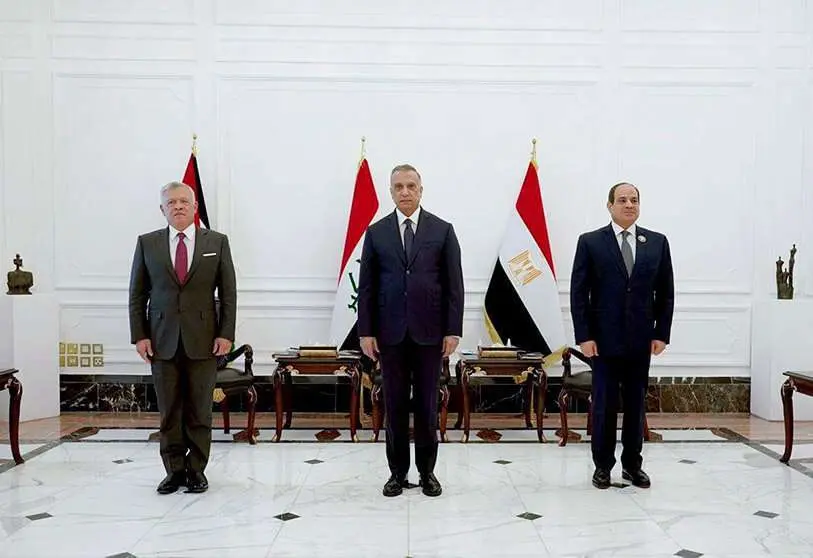Al-Sisi visits Iraq for the first time since the invasion of Kuwait

Egyptian President Abdel Fattah al-Sisi has visited Iraq in a historic meeting. This is the first time since the invasion of Kuwait that an Egyptian leader has visited Iraq with the aim of strengthening relations and reinforcing cooperation in security and economic matters.
The meeting has become a tripartite summit comprising the Egyptian leader, Iraqi Prime Minister Mustafa al-Kazemi and Jordan's King Abdullah II. Upon his arrival, Al-Sisi was received by Iraq's President Barham Saleh and then met with Iraqi Prime Minister Al-Kazemi.

The Jordanian king arrived shortly afterwards to join the round of talks with both incumbents in what would be a third round of tripartite talks. The meetings, which were marked by an attempt to mitigate Iranian influence in the region, dealt with security, energy and trade issues, according to a joint communiqué issued at the end of the meeting.
The Iraqi prime minister welcomed the Egyptian president and the Jordanian king, saying that "we are establishing a future worthy of our peoples, according to the logic of cooperation and integration". Al-Sisi declared his support for Iraq in the fight against extremism and terrorism and stressed that "this visit sends an important message to our people, of mutual support, we are united to work for the peoples of the region".

Similarly, the talks covered regional issues related to the conflicts in Syria, Yemen, Israel and Palestine, as well as the growing presence of Daesh in the region. In this regard, experts and observers reiterate that the tripartite summit in Baghdad 'is important to move towards the Arab horizon with practical and realistic steps'. In this vein, Al-Kazemi wants to strengthen Iraq's position in the region as an intermediary, after the country mediated the Saudi Iranian dialogue on the Yemeni war. In the talks, Iraq was reluctant to remain the battleground for international disputes.
With this meeting, Egypt continues to establish itself as a country in the eastern region that wants to present itself as a mediating state. In the first instance, Egypt played a key role in Israel's approval of a unilateral ceasefire after 11 days of Palestinian-Israeli offensives. Following the cessation of attacks in the Gaza Strip, Egypt has led the reconstruction of the area and provided humanitarian and health assistance in the area following the opening of several health corridors.

Egypt has also backed the Libyan National Unity Government and repeatedly demanded the withdrawal of foreign troops, mostly of Turkish origin. In this regard, both countries have already established peace points and have supported the holding of the next elections in the country, scheduled for 24 December. Furthermore, from the Mediterranean countries of the European Union, there is a rapprochement between Greece and Cyprus, which have already agreed to continue cooperating together in order to achieve common objectives in the area of economic cooperation.
In this way, Egypt continues to lead a frantic diplomatic race to establish its influence as a key country in the region, while trying to curb the Turkish and Iranian presence in the Middle East region. Likewise, this meeting comes in the midst of a delicate situation in the country, as in the last few hours the United States, supported by Iran, has ordered the launch of an attack on the border between Syria and Iraq in which at least seven militiamen have been killed, according to the Egyptian Observatory for Human Rights. This attack comes in a context in which Daesh in Iraq has once again extended its threat in the country, as evidenced by the latest attacks perpetrated in the area by the terrorist group in the country.

In the last few days, five policemen have been killed in an attack carried out by Daesh members in Iraqi territory. In addition, Turkey is trying to escalate its position in the country by attacking the Kurds in the Iraqi Kurdistan region. In this line, the Ottoman country has "neutralised" three members of the PKK. This party has several bases in the Qandil region, where Turkey has recently extended its operations, including bombings around the Majmur camp against alleged Kurdish members who continue to operate offensives against Daesh.








